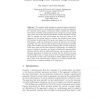Free Online Productivity Tools
i2Speak
i2Symbol
i2OCR
iTex2Img
iWeb2Print
iWeb2Shot
i2Type
iPdf2Split
iPdf2Merge
i2Bopomofo
i2Arabic
i2Style
i2Image
i2PDF
iLatex2Rtf
Sci2ools
127
click to vote
COLT
2006
Springer
2006
Springer
Online Learning with Variable Stage Duration
We consider online learning in repeated decision problems, within the framework of a repeated game against an arbitrary opponent. For repeated matrix games, well known results establish the existence of no-regret strategies; such strategies secure a long-term average payoff that comes close to the maximal payoff that could be obtained, in hindsight, by playing any fixed action against the observed actions of the opponent. In the present paper we consider the extended model where the duration of each stage of the game may depend on the actions of both players, while the performance measure of interest is the average payoff per unit time. We start the analysis of online learning in repeated games with variable stage duration by showing that no-regret strategies, in the above sense, do not exist in general. Consequently, we consider two classes of adaptive strategies, one based on Blackwell's approachability theorem and the other on calibrated forecasts, and examine their performance...
| Added | 20 Aug 2010 |
| Updated | 20 Aug 2010 |
| Type | Conference |
| Year | 2006 |
| Where | COLT |
| Authors | Shie Mannor, Nahum Shimkin |
Comments (0)

